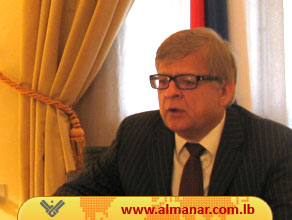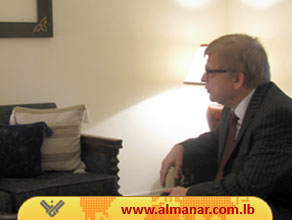Al-Manar Website had an exclusive interview with the Russian Ambassador to Lebanon Alexander Zasypkin.
Somaya Ali
 At first glance, Alexander Zasypkin seems to be very dynamic. Immediately after entering, he invites you to have a seat and start asking your interview questions which he prefers to be a "chat" between two persons. But the moment of diving in the Syrian issue and its complexity, Zasypkin seems committed to red lines, starting from not to name those countries that support armed groups in Syria, and ending up with not to talk in detail about what is happening in northern Lebanon, where it is said that the spot has become a conduit for weapons and fighters to Syria. After the end of dialogue with Zasypkin, who lives in Lebanon since 1973, you will reach one conclusion: the veto will remain on table when it comes to Syria.
At first glance, Alexander Zasypkin seems to be very dynamic. Immediately after entering, he invites you to have a seat and start asking your interview questions which he prefers to be a "chat" between two persons. But the moment of diving in the Syrian issue and its complexity, Zasypkin seems committed to red lines, starting from not to name those countries that support armed groups in Syria, and ending up with not to talk in detail about what is happening in northern Lebanon, where it is said that the spot has become a conduit for weapons and fighters to Syria. After the end of dialogue with Zasypkin, who lives in Lebanon since 1973, you will reach one conclusion: the veto will remain on table when it comes to Syria.
Q: Your Excellency, how to explain the contradiction of the Russian Foreign Minister Sergei Lavrov's statement after a meeting of Arab foreign ministers, where he confirmed his country's rejection of any decisions not adopted by the Syrian regime on the one hand, while on the other hand he announced a study of the Arab League’s proposal to send peacekeeping troops to Syria?
Ambassador Zasypkin: I do not consider there is a contradiction in Lavrov’s statement, because this proposal cannot be achieved without the approval of the Syrian authorities and at the same time it is useful to study the proposal of the League in all its details. So we believe that sending peacekeeping forces can be only through stopping the violence that we are working to achieve since the crisis began. We consider this essential.
Q: Will there be a change in Russian position about the situation in Syria? Will you continue to use the veto to prevent the issuance of any Security Council’s resolution condemning the system?
Ambassador Zasypkin: Our position with respect to any resolution regarding Syria stems from several constants: Searching for a peaceful political settlement of the internal Syrian dispute without any foreign meddling, and establishing a comprehensive dialogue between the regime and all opposition factions. We do not see a good future for Syria through toppling the regime, but through implementing reform steps via a new constitution and early elections.
Q: Some Arab kings accuse Russia of being in the face of the Arab consensus and the will of the Syrian people in standing permanent by the regime’s side, how do you respond to that?
Ambassador Zasypkin: We respect the decisions of the Arab League, but at the same time we have our own decision regarding some resolutions which we have reservations on its content. As for the Observers Mission’s work, we believe the Mission has played a positive role during its presence in Syria and it was better for the League to take the content of its report seriously. We take into account the positions of the League, but we cannot approve all of its decisions, especially if they go against our convictions.
Q: Your Excellency, why you used the veto twice to prevent the issuance of a resolution condemning the Syrian regime or allowing foreign intervention in Syria, at a time you were satisfied to abstain from voting on the resolution 1973, which grants the NATO the right of military intervention in Libya?
Ambassador Zasypkin: as for Libya, it was the first experiment of its kind during the Arab spring events. Russia has refrained from voting at the time because we thought that the implementation of an air embargo will reduce the number of civilian deaths. However, other parties exceeded their powers regarding the resolution and carried out the NATO operation against Libya, which was totally against the Russian desire. It was a bad experience. Since the beginning we told all parties – and in the words of President Dmitry Medvedev - that we will not agree upon a similar resolution and a similar experience in Syria.
Q: Do you deny the existence of strategic dimension to your position towards the situation in Syria?
Ambassador Zasypkin: Syria has particular importance not only for Russia, but at the international and regional levels as well. We do not deny our friendly relations with Syria, but we do not look to the Syrian regime as an ally of Russia, because we do not consider any state allied to us since the era of the Soviet Union. The Russian policy is not based on alliances, but on the partnership with larger number of countries. Therefore, we stress that in the Syrian case we are not defending the Syrian regime, but the international legitimacy.
Q: Do you think what is happening in Syria is not a revolution, or in other words, do you think a conspiracy is being hatched against Syria by supporting armed groups with weapons and gear?
Ambassador Zasypkin: From its beginning, popular movement in Syria was demanding freedom, democracy and addressing internal, economic and social problems and others. We sympathized with the peaceful demonstrations. Yet, on the sidelines of those protests, armed groups began to appear increasingly. Those started to acquire power and fight the regime without seeking democratic reforms, but regime change.
Q: can we conclude from your words that the Syrian people do not want the regime fall, but only reforms?
Ambassador Zasypkin: Certainly the Syrian people want reform, so a transparent and fair election is required. We'll see then whom the Syrian people will choose to manage the affairs of his country.
Q: according to your information, is there anyone who is funding the armed groups in Syria to apply a certain agenda?
Ambassador Zasypkin: I cannot provide any detailed information about arms funding or smuggling, so I will just make political analysis. This analysis indicates that the armed groups aim at bringing down the regime.
 Q: In your opinion, what are the reasons behind this Arab insistence on the overthrow of regime in Syria? How do you explain the Qatari double-standard stance towards the events, so that the Qatari government is striving to overthrow the Syrian regime at the same time it is keeping silent before what is happening in Bahrain?
Q: In your opinion, what are the reasons behind this Arab insistence on the overthrow of regime in Syria? How do you explain the Qatari double-standard stance towards the events, so that the Qatari government is striving to overthrow the Syrian regime at the same time it is keeping silent before what is happening in Bahrain?
Ambassador Zasypkin: In our contacts with the Arab and Gulf states, we always try to find common ground with them. We received in Moscow the Foreign Ministers of Bahrain and UAE, and we tried to emphasize the need to stop the violence and find a political solution in Syria, and will continue efforts to deal with the Gulf States. At the same time it must be noted that the regional conflicts and contradictions, of course, affect the conditions that govern the internal conflicts, including what is happening in Syria and the Arab position toward the regime there. I do not want to talk at length about those conflicts, but we hope that the superior interests of the peoples will dominate the self-interests of States.
Q: Does this mean that behind Qatar's insistence on the need to overthrow President al-Assad is compliance for regional conflicts and application of a foreign agenda?
Ambassador Zasypkin: Again I do not want to accuse any party. But we believe that some of media channels are covering the events for the benefit of certain parties. We work through all available means to clarify the reality and the Russian position towards what occurs in Syria.
Q: Henry Kissinger has talked about an imminent war in the region. In addition to that, Israeli officials spoke on a strike against Iran. Do you predict a possibility of war soon in the region?
Ambassador Zasypkin: As for the Iranian issue, the nuclear file in particular, it can only be resolved by political and diplomatic means. It is better for all parties to stay away from any military conflict with Iran because it will bring disasters to the region. In personally believe that such disaster is unlikely, but that does not prevent us from being careful and to follow how things are going. We are make every effort to prevent war in the region.
Q: How true is what was said about offering temptations to Russia in return for abstaining from using the veto during the last hours before the voting session of the Security Council?
Ambassador Zasypkin: We must be absolutely clear that the use of Russia's veto was not because of the inability of other parties convince us not to use it. That was our principled position based on our concept of what is happening in Syria. There has been no discussion about a particular bargaining. It was a debate about the content of the draft resolution and there was a progress made in the issue of foreign interference in the clause related to imposing sanctions. We have a common ground with respect of certain clauses, but the draft resolution contained some of unbalanced clauses, primarily focusing on the violence practiced by the Syrian authorities. We have also objected on the full implementation of the Arab initiative, which provides for the transfer of power. We said that it must be done through elections and the choice of the people of Syria.
Q: Recently, Deputy Foreign Minister Faisal Mikdad sent an implicit message to Lebanon stating that his country will claim the neighboring countries where armed groups are supported by smuggling weapons, what is your position on that?
Ambassador Zasypkin: It is important for the Lebanese authorities to provide security, stability and cut the way for arms smuggling. We look positively to the Lebanese army deployment in the north.
Q: What is required of the Muslim Brotherhood, specifically in Egypt, at the level of domestic and foreign policy?
Ambassador Zasypkin: Politically, we are ready to cooperate with the Islamic parties. As for Egypt, we believe the reform process has started but not completed yet. All parties - including the liberals, the Islamists and the army – are required to take advanced steps to achieve the goals of the Egyptian people’s revolution, such as solving the social and economic problems. At the regional level, we insist that it is not permissible to neglect the fundamental and central issue in the region, which is the Arab-Israeli conflict, and on finding a comprehensive solution to this conflict in order to achieve peace.
Q: How do you assess the situation in Libya today?
Ambassador Zasypkin: The situation in Libya is difficult. The NATO has left large destruction in the country. Moreover, foreign meddling has lead to a further deterioration in Libya. There is chaos and continuous clashes in some areas. We hope that steps will be taken towards normalizing the situation in Libya in an integrated manner.
Translated by: Eslam al-Rihani